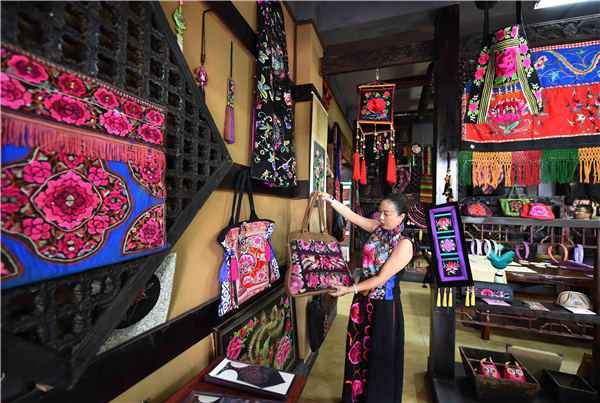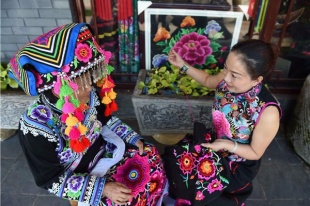Threading tradition into the present day


Long process of transformation
Liang Bofa, a sales manager of Miyilu's branch in Kunming, the provincial capital, proudly displays a piece of embroidery, about 4 meters in length and 1 meter wide. "Camellias are embroidered on this piece, which usually takes more than two embroiderers more than a year to make," he said.
Liang explains that the camellia is a popular flower among the Yi people, but such a big piece is extremely rare. "Embroidery needs patience and persistence, otherwise the works will not be beautiful and will not be accepted by buyers," he said.
Luo said women of the Yi ethnic group were "born with the gene to make beautiful artwork", but the fact that every woman has her own view about beauty made it a long and difficult process to make the embroidery a commercial prospect.
For example, Yi people favor natural colors such as dark red and green. However, many potential customers prefer less-dominant hues.
Therefore, training and quality control are necessary to ensure the embroidery can be sold.
For Luo, if the traditional craft is to survive, it has to accept the latest fashion trends.
New role
Luo's contribution in promoting and saving ethnic culture and increasing income for her workers has won her recognition. In January, she was elected a deputy to the 13th National People's Congress, the only one in her county.
The new identity started a new phase in her life.
"Behind me are thousands of embroiderers and inheritors of intangible cultural heritage. So I must speak for them, calling for more support to prolong our traditional arts and techniques," Luo said.
Before the NPC annual session in March, Luo surveyed many embroiderers in Dayao's Tanhua township. She found some young embroiderers were uncertain about the future.
Therefore, Luo was especially interested in sections of the Government Work Report on the development of ethnic culture and micro-sized enterprises.
During the congress, she suggested that more support should be given to small enterprises in the cultural sector as well as industries based on intangible ethnic cultural heritages.
Brands should be made for these industries related to ethnic culture, she wrote in the suggestions. Following her return to Dayao after the NPC session concluded, Luo propagated key policies for her company, local communities and among some local officials.
"Many people paid attention to the sessions and I explained more about key agendas such as the constitutional amendment," Luo said with pride.
"As a deputy from a border area, I will focus on rural affairs, including poverty alleviation. I will strive to be voice for local people, so they get more attention and support as a deputy elected by local people," she added.





































